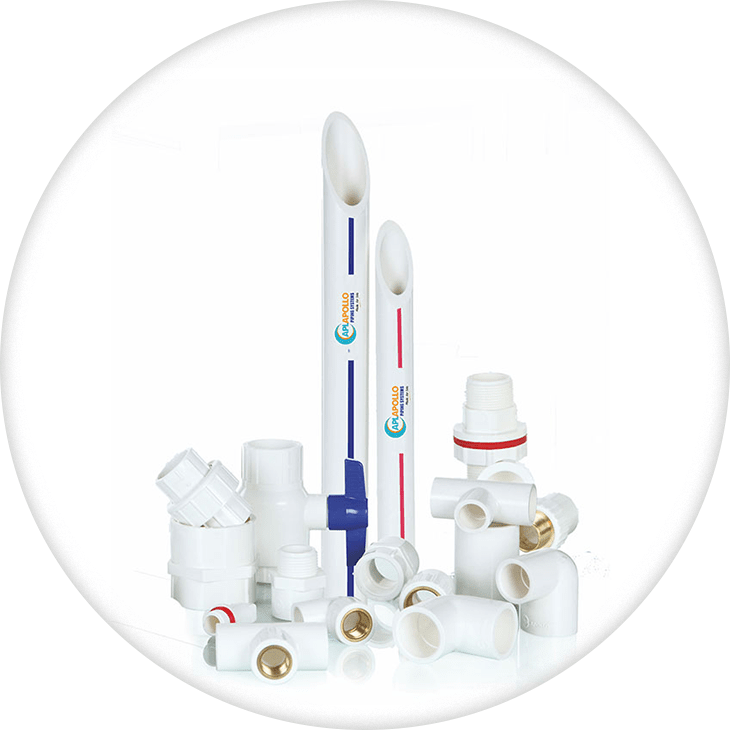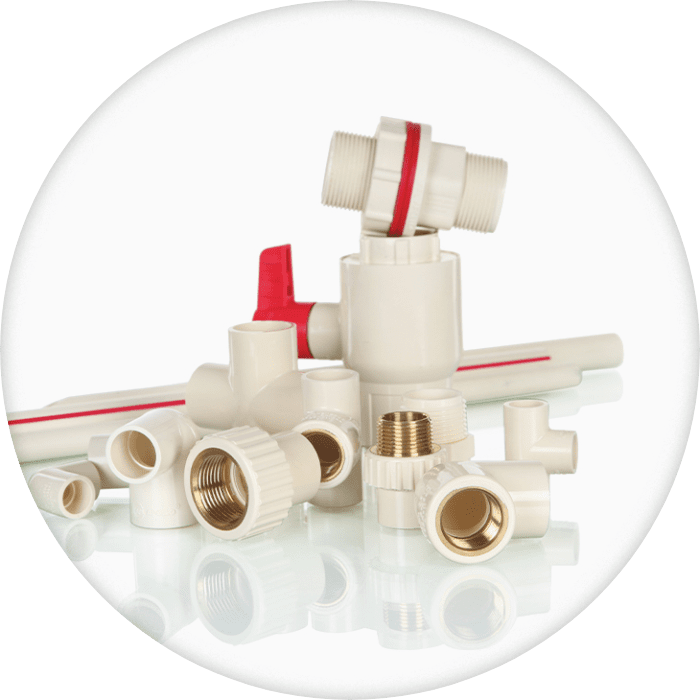UPVC PIPES
 The extended form of UPVC is Unplasticized Polyvinyl Chloride. As the name suggests it is made without using plastic, thus it becomes rigid and its rigidity and hardness make it hard to withstand external and internal forces such as heat, weather, moisture and various chemicals, and so on. UPVC is produced by using sodium chloride, which is electrolyzed to produce chlorine gas. To make them suitable for heat and UV stabilizer chemicals are added in the manufacturing process. UPVC is brittle and inelastic in its nature and is the most used variant of PVC water pipes. UPVC pipes are able to handle a wide range of temperatures.
The extended form of UPVC is Unplasticized Polyvinyl Chloride. As the name suggests it is made without using plastic, thus it becomes rigid and its rigidity and hardness make it hard to withstand external and internal forces such as heat, weather, moisture and various chemicals, and so on. UPVC is produced by using sodium chloride, which is electrolyzed to produce chlorine gas. To make them suitable for heat and UV stabilizer chemicals are added in the manufacturing process. UPVC is brittle and inelastic in its nature and is the most used variant of PVC water pipes. UPVC pipes are able to handle a wide range of temperatures.
FEATURES OF UPVC PIPES
Due to the absence of plastic, UPVC pipes are not flexible and bendable. UPVC pipes are very lightweight, economical, leak-resistant, low maintenance, and smooth flow of water which make them the best and most popular choice for several households and industrial applications. In a nutshell, UPVC pipes are lead-free, UV-resistant, chemical-resistant, pressure-resistant, and waterproof. UPVC pipes also have wonderful electrical properties and low flammability. UPVC pipes are well-known for their durability, fire-resistance property, and recyclability. In real terms, UPVC pipes are nearly as rigid as iron pipes.
APPLICATIONS OF UPVC PIPES
UPVC pipes are widely used across households and industrial sectors. These pipes are used for supplying and carrying potable water or water transfer in bathrooms, kitchens, sinks, laboratories, etc. These are also used for supplying edible fluids. They are also used for solar heating, central heating, and radiant floor heating applications.
APL Apollo UPVC Plumbing Pipes are also lead-free, non-toxic, and thus used in various applications such as potable water pipes, specifically formulated for the use. Apollo has a wide range of UPVC piping systems such as UPVC pressure piping systems, UPVC SWR piping systems, UPVC plumbing systems, UPVC well casing pipes, UPVC column pipes, etc.
CPVC PIPES
CPVC pipes are Chlorinated Polyvinyl Chloride that is used widely for water distribution requirements in residential, commercial, and industrial sectors. CPVC was invented in 1959 by Lubrizol in the United State of America. As we are aware that the CPVC pipes are manufactured from Chlorinated Polyvinyl Chloride, a thermoplastic material that is able to withstand higher temperatures and is more flexible and durable. CPVC is produced by adding chlorine to PVC in a water slurry or fluidized bed chlorination process. The chlorination reaction is initiated by ultraviolet light. CPVC pipes are generally used in households for the supply of hot and cold water. CPVC is an excellent material due to its inherent chemical resistance features dependability, and capacity to withstand high heat and pressure. Chlorination is undertaken to get the properties like more flexibility and the ability to withstand high temperatures. CPVC pipes can be used to carry high-temperature liquids. CPVC pipes have been credited with potable water certification across the world. CPVC pipes are most suitable and widely used for drinking water supply and transmission in residential and industrial areas.
pipes are Chlorinated Polyvinyl Chloride that is used widely for water distribution requirements in residential, commercial, and industrial sectors. CPVC was invented in 1959 by Lubrizol in the United State of America. As we are aware that the CPVC pipes are manufactured from Chlorinated Polyvinyl Chloride, a thermoplastic material that is able to withstand higher temperatures and is more flexible and durable. CPVC is produced by adding chlorine to PVC in a water slurry or fluidized bed chlorination process. The chlorination reaction is initiated by ultraviolet light. CPVC pipes are generally used in households for the supply of hot and cold water. CPVC is an excellent material due to its inherent chemical resistance features dependability, and capacity to withstand high heat and pressure. Chlorination is undertaken to get the properties like more flexibility and the ability to withstand high temperatures. CPVC pipes can be used to carry high-temperature liquids. CPVC pipes have been credited with potable water certification across the world. CPVC pipes are most suitable and widely used for drinking water supply and transmission in residential and industrial areas.
FEATURES OF CPVC PIPES
CPVC piping has a lower thermal conductivity that not only reduces heat loss but keeps the surface temperature of the pipe lower, reducing the chance of burns to maintenance and operating personnel. CPVC has special mechanical strength that makes it more durable and stable. The CPVC pipes are made from finished compounds that are lead-free making them potable water certified.
CPVC pipes are known for being corrosion-resistance, anti-bacterial, fire-resistance, chemical resistance and leak-proof. When talking of temperature resistance, CPVC pipes can withstand a higher degree of temperature than UPVC pipes. In fact, whereas UPVC can withstand up to 60 degrees celsius temperature but CPVC can bear up to 93 Degree Celsius temperature making it best suited for both hot and cold water transmission.
APPLICATIONS OF CPVC PIPES
CPVC pipes are generally used in households for the supply of hot and cold water. CPVC pipes are used for Indoor and outdoor Installations of hot and cold-water plumbing lines, water heaters, concealed, exterior, and terrace water pipelines, public utilities, and swimming pools, and residential and commercial buildings.
APL Apollo CPVC Pipes are manufactured conforming to various international quality standards approved in the developed countries. If maintenance and corrosion-free service and best-in-class quality are the prerequisites for a plumbing system, thus APL Apollo CPVC Pipes & Fittings are the perfect solution.

 The extended form of UPVC is Unplasticized Polyvinyl Chloride. As the name suggests it is made without using plastic, thus it becomes rigid and its rigidity and hardness make it hard to withstand external and internal forces such as heat, weather, moisture and various chemicals, and so on. UPVC is produced by using sodium chloride, which is electrolyzed to produce chlorine gas. To make them suitable for heat and UV stabilizer chemicals are added in the manufacturing process. UPVC is brittle and inelastic in its nature and is the most used variant of PVC water pipes. UPVC pipes are able to handle a wide range of temperatures.
The extended form of UPVC is Unplasticized Polyvinyl Chloride. As the name suggests it is made without using plastic, thus it becomes rigid and its rigidity and hardness make it hard to withstand external and internal forces such as heat, weather, moisture and various chemicals, and so on. UPVC is produced by using sodium chloride, which is electrolyzed to produce chlorine gas. To make them suitable for heat and UV stabilizer chemicals are added in the manufacturing process. UPVC is brittle and inelastic in its nature and is the most used variant of PVC water pipes. UPVC pipes are able to handle a wide range of temperatures.  pipes are Chlorinated Polyvinyl Chloride that is used widely for water distribution requirements in residential, commercial, and industrial sectors. CPVC was invented in 1959 by Lubrizol in the United State of America. As we are aware that the
pipes are Chlorinated Polyvinyl Chloride that is used widely for water distribution requirements in residential, commercial, and industrial sectors. CPVC was invented in 1959 by Lubrizol in the United State of America. As we are aware that the 
